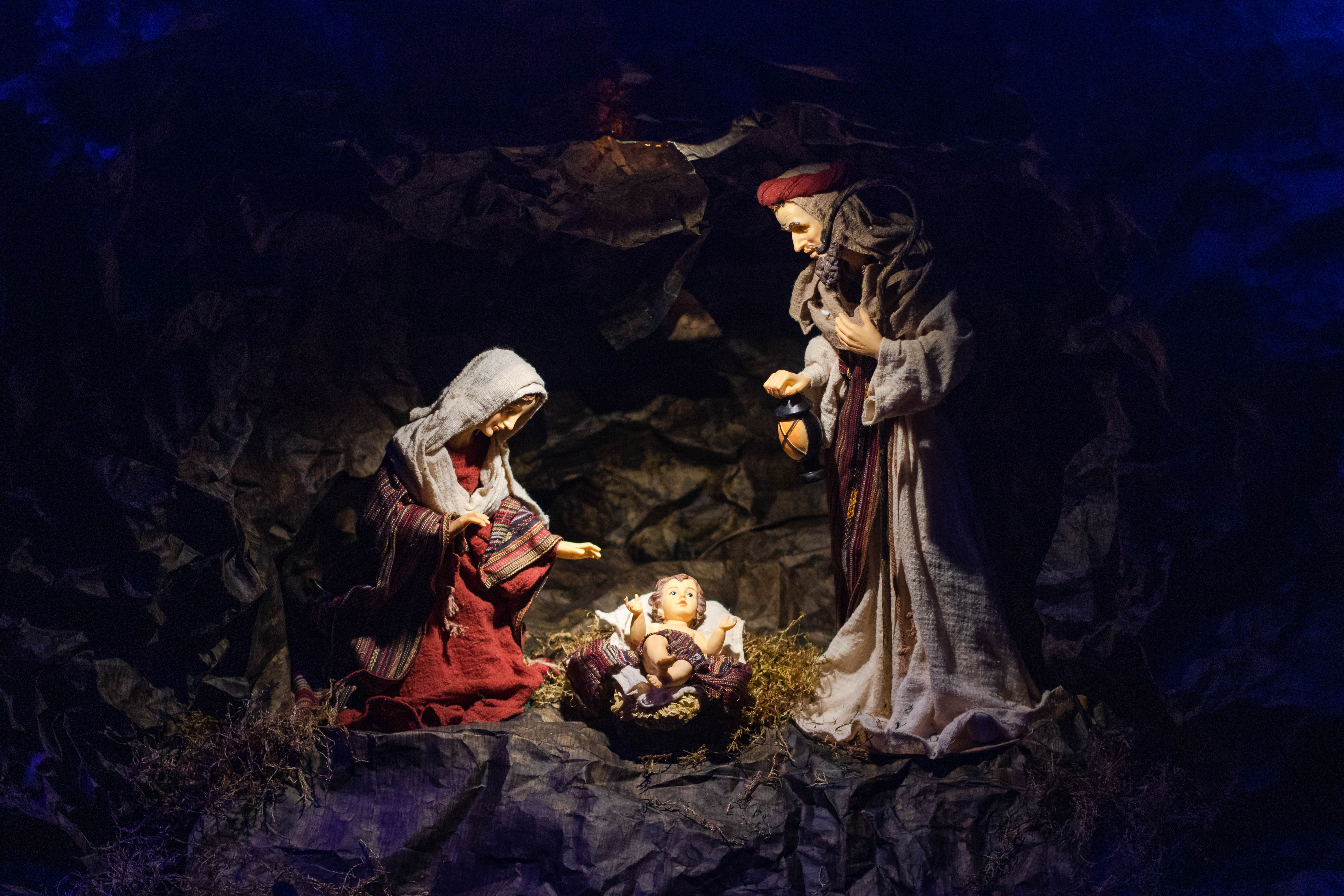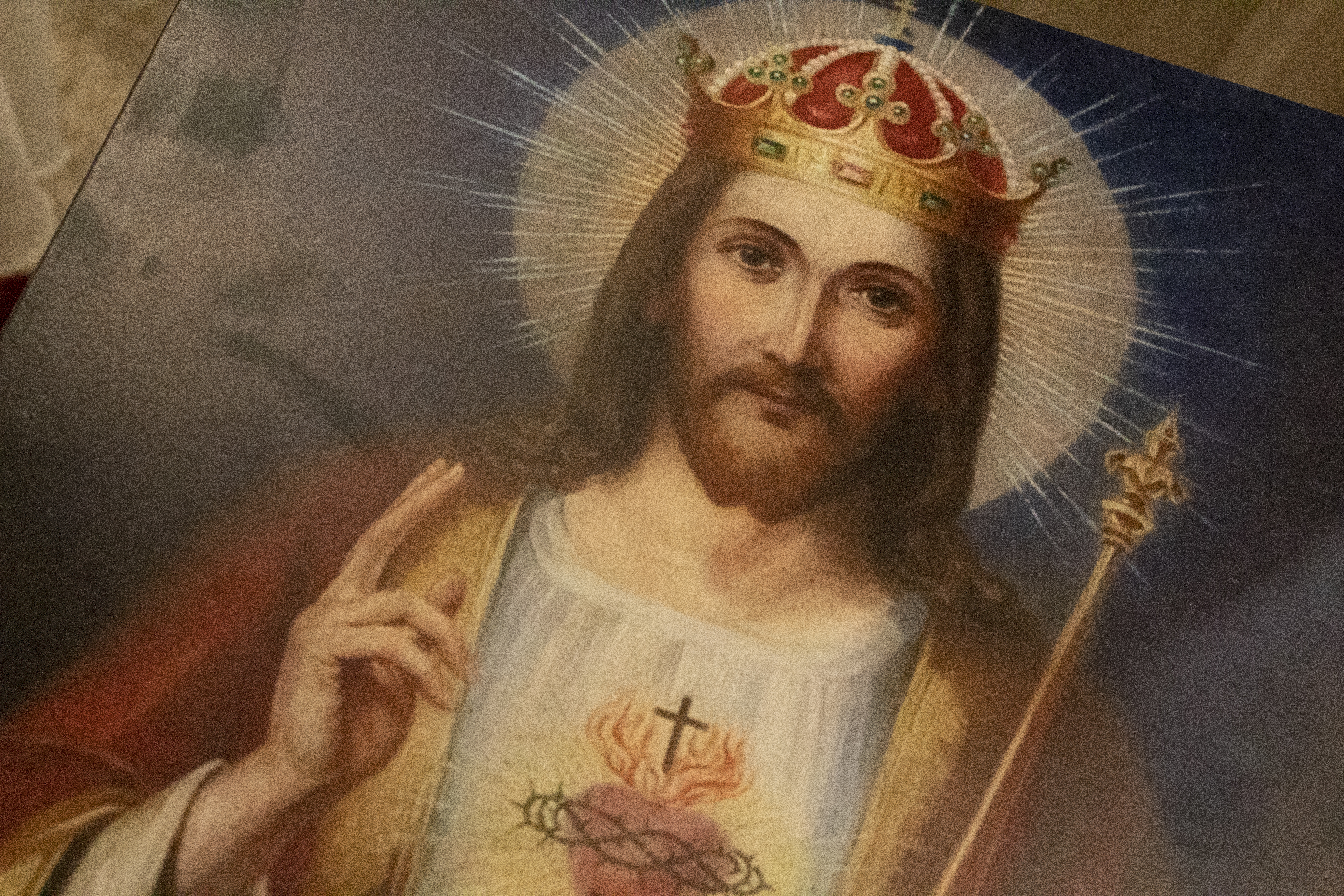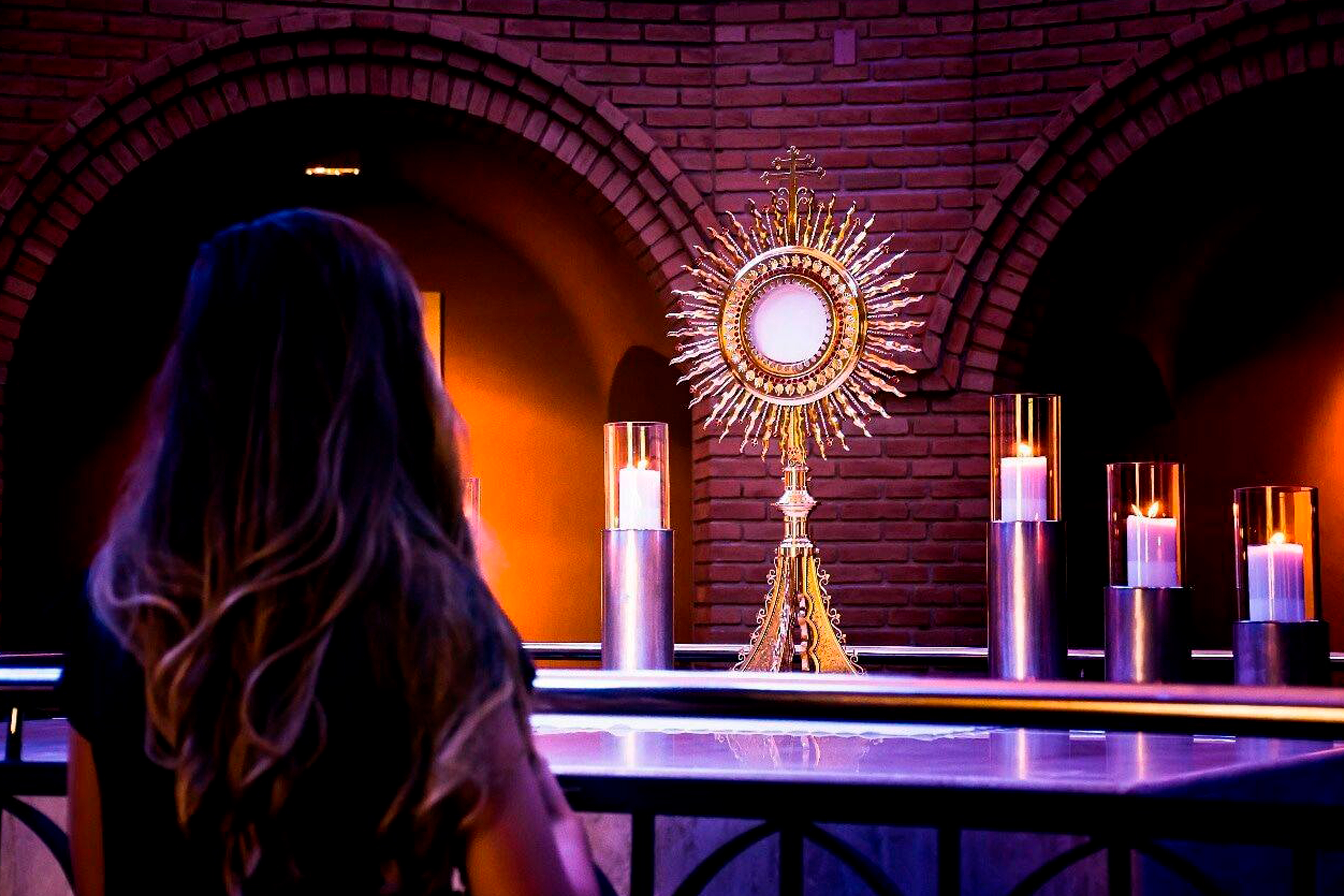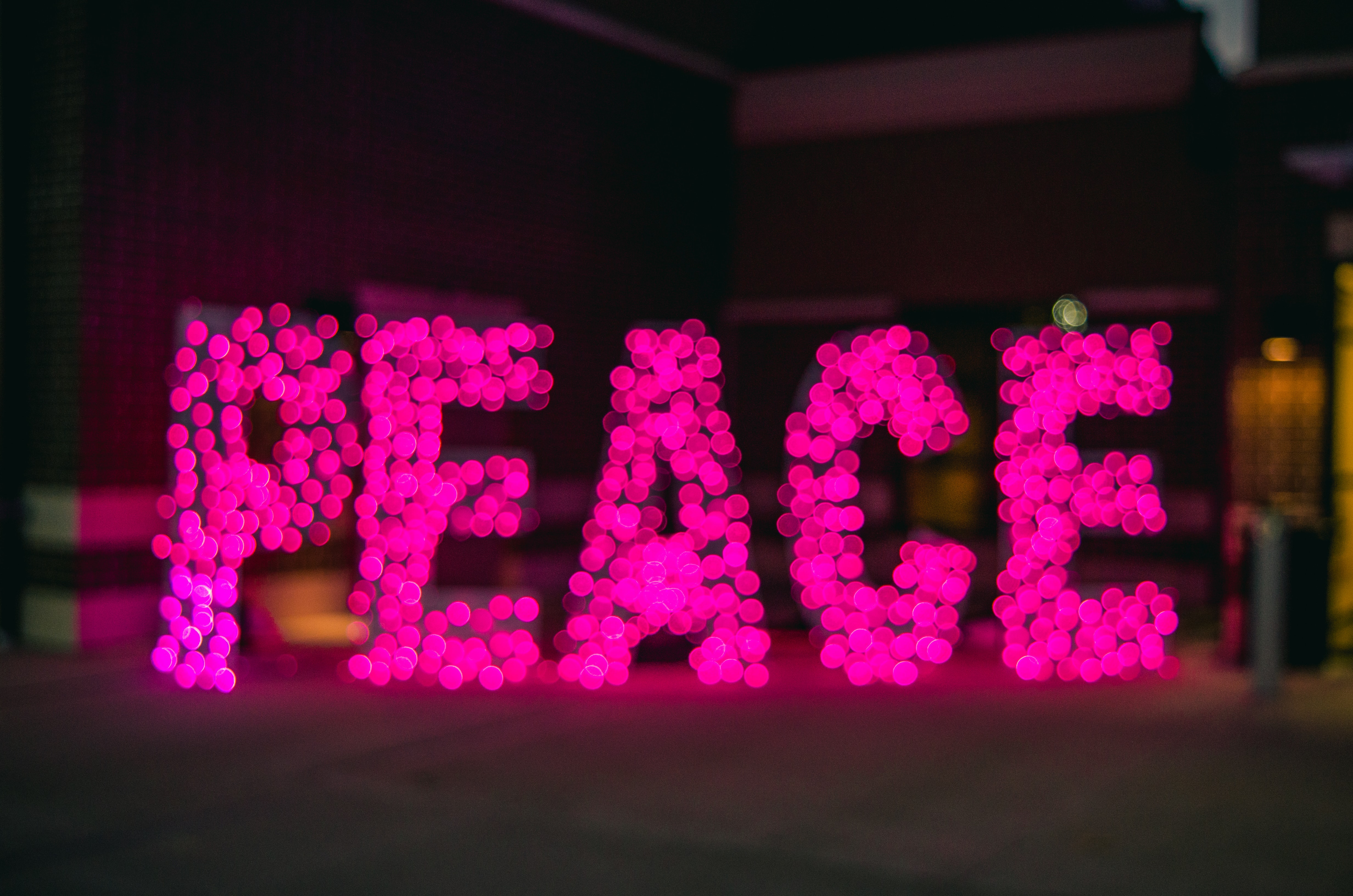Every Sunday, Catholics are bound by obligation to go to the “house of the Lord” to attend Mass. Of course, many fail to meet this obligation. Others would never dream of missing Mass for any reason other than illness. But I wonder if many of us go every week, but fail to “go rejoicing.”
Weeks are long and weekends are short. Life is hard and we are so busy, so tired. Catching up on household chores, sleeping in, trying to have a little fun with family or friends—for many of us there is so much we want to do or need to do that a weekend never seems long enough. Sunday Mass can begin to feel like just another weekend chore, and maybe even one that we resent having to do.
I spent an evening with some of my best high school friends recently. We have known each other for over 40 years, and we all attended Catholic schools together. We found ourselves reminiscing about morning Mass, which was strictly voluntary once we were in high school. I attended exceedingly rarely. I told my friends what I have often thought since—how I did not appreciate what an opportunity it was to have Mass available daily, how much I wish daily Mass could fit in my schedule right now, how I regret all those Masses I skipped so I could have a few extra minutes to chat with my friends before school.
I am not perfect. I have missed Mass before without a legitimate excuse. There are Sundays when I wish I could stay in bed, when the secular concept of a lazy Sunday morning seems compelling.
But one thing I know: I NEVER regret that I made it to Mass. There is nowhere I am happier and more at peace than in our favorite pew at the church I have attended since I was baptized there as an infant.
In today’s Gospel we hear the centurion speak to Jesus in the words we echo at every Mass: “Lord, I am not worthy that you should enter under my roof.” Every week we admit that we are not worthy to receive Jesus and yet he chooses to be present with us anyway. And it follows that we are much less worthy to enter under HIS roof, the house of the Lord. Yet every week—every DAY if we wish—we have that honor.
Today is the second day of Advent, so therefore the second day of the liturgical year. New years are a good occasion for resolutions. Can we resolve to appreciate Sunday Mass as a privilege rather than looking at it as a chore? Can we resolve to “go rejoicing”?
Todos los domingos, los católicos tienen la obligación de ir a la “casa del Señor” para asistir a Misa. Por supuesto, muchos no cumplen con esta obligación. Otros nunca pensarían faltar a misa por cualquier motivo que no sea una enfermedad. Pero me pregunto si muchos de nosotros vamos todas las semanas, pero fallamos en “irnos regocijando”.
Las semanas son largas y los fines de semana son cortos. La vida es dura y estamos tan ocupados, tan cansados. Ponerse al día con los quehaceres de la casa, dormir hasta tarde, tratar de divertirnos un poco con la familia o los amigos: para muchos de nosotros hay tanto que queremos o tenemos que hacer que un fin de semana nunca parece suficiente. La misa dominical puede comenzar a sentirse como una tarea más del fin de semana, y tal vez incluso una que nos molesta tener que hacer.
Recientemente pasé una noche con algunos de mis mejores amigos de la escuela secundaria. Nos conocemos desde hace más de 40 años y todos asistimos juntos a escuelas católicas. Nos encontramos recordando la Misa de la mañana, que era estrictamente voluntaria una vez que estábamos en la escuela secundaria. Asistí muy raramente. Les dije a mis amigos lo que he pensado a menudo desde entonces: cómo no apreciaba la oportunidad que era tener Misa disponible todos los días, cuánto desearía que la Misa diaria pudiera caber en mi horario en este momento, cuánto lamento todas esas Misas que me salté solamente para tener unos minutos extras para charlar con mis amigos antes de ir a clase.
No soy perfecta. He faltado a misa sin una excusa legítima. Hay domingos en los que desearía poder quedarme en la cama, cuando el concepto secular de una perezosa mañana de domingo parece convincente.
Pero una cosa sí sé: NUNCA me arrepiento de haber ido a Misa. No hay ningún lugar en el que me sienta más feliz y en paz que en nuestro banco favorito en la iglesia a la que he asistido desde que me bautizaron allí cuando era bebé.
En el Evangelio de hoy escuchamos al centurión hablarle a Jesús con las palabras que repetimos en cada misa: “Señor, no soy digno de que entres a mi casa”. Cada semana admitimos que no somos dignos de recibir a Jesús y, sin embargo, él escoge estar presente con nosotros. Y se sigue que somos mucho menos dignos de entrar bajo SU techo, la casa del Señor. Sin embargo, todas las semanas, todos los DÍAS si lo deseamos, tenemos ese honor.
Hoy es el segundo día de Adviento, por lo tanto, el segundo día del año litúrgico. Los nuevos años son una buena ocasión para los propósitos. ¿Podemos decidir apreciar la misa dominical como un privilegio en lugar de verla como una tarea? ¿Podemos decidir “irnos regocijando”?
 Leslie Sholly is a Catholic, Southern wife and mother of five, living in her hometown, Knoxville, Tennessee. She graduated from Georgetown University with an English major and Theology minor. She blogs at Life in Every Limb, where for 11 years she has covered all kinds of topics, more recently focusing on the intersection of faith, politics, and social justice.
Leslie Sholly is a Catholic, Southern wife and mother of five, living in her hometown, Knoxville, Tennessee. She graduated from Georgetown University with an English major and Theology minor. She blogs at Life in Every Limb, where for 11 years she has covered all kinds of topics, more recently focusing on the intersection of faith, politics, and social justice.
Feature Image Credit: Florian Weichert, unsplash.com/photos/95flJvpA5Iw


 Deacon Dan Schneider is a retired general manager of industrial distributors. He and his wife Vicki have been married for over 50 years. They are the parents of eight children and thirty grandchildren. He has a degree in Family Life Education from Spring Arbor University. He was ordained a Permanent Deacon in 2002. He has a passion for working with engaged and married couples and his main ministry has been preparing couples for marriage.
Deacon Dan Schneider is a retired general manager of industrial distributors. He and his wife Vicki have been married for over 50 years. They are the parents of eight children and thirty grandchildren. He has a degree in Family Life Education from Spring Arbor University. He was ordained a Permanent Deacon in 2002. He has a passion for working with engaged and married couples and his main ministry has been preparing couples for marriage.
 Kate Taliaferro is an Air Force wife and mother. She is blessed to be able to homeschool, bake bread and fold endless piles of laundry. When not planning a school day, writing a blog post or cooking pasta, Kate can be found curled up with a book or working with some kind of fiber craft. Kate blogs at
Kate Taliaferro is an Air Force wife and mother. She is blessed to be able to homeschool, bake bread and fold endless piles of laundry. When not planning a school day, writing a blog post or cooking pasta, Kate can be found curled up with a book or working with some kind of fiber craft. Kate blogs at 
 J.M. Pallas has had a lifelong love of Scriptures. When she is not busy with her vocation as a wife and mother to her “1 Samuel 1” son, or her vocation as a public health educator, you may find her at her parish women’s bible study, affectionately known as “The Bible Chicks.”
J.M. Pallas has had a lifelong love of Scriptures. When she is not busy with her vocation as a wife and mother to her “1 Samuel 1” son, or her vocation as a public health educator, you may find her at her parish women’s bible study, affectionately known as “The Bible Chicks.”
 Kathryn Mulderink, MA, is married to Robert, Station Manager for Holy Family Radio. Together they have seven children (including Father Rob), and seven grandchildren. She is President of the local community of Secular Discalced Carmelites and has published five books and many articles. Over the last 30 years, she has worked as a teacher, headmistress, catechist, Pastoral Associate, and DRE, and as a writer and voice talent for Catholic Radio. Currently, she serves the Church by writing and speaking, and by collaborating with various parishes and to lead others to encounter Christ and engage their faith. Her website is
Kathryn Mulderink, MA, is married to Robert, Station Manager for Holy Family Radio. Together they have seven children (including Father Rob), and seven grandchildren. She is President of the local community of Secular Discalced Carmelites and has published five books and many articles. Over the last 30 years, she has worked as a teacher, headmistress, catechist, Pastoral Associate, and DRE, and as a writer and voice talent for Catholic Radio. Currently, she serves the Church by writing and speaking, and by collaborating with various parishes and to lead others to encounter Christ and engage their faith. Her website is 
 Susan Ciancio has a BA in psychology and a BA in sociology from the University of Notre Dame, with an MA in liberal studies from Indiana University. For the past 19 years, she has worked as a professional editor and writer, editing both fiction and nonfiction books, magazine articles, blogs, educational lessons, professional materials and website content. Thirteen of those years have been in the pro-life sector. Currently Susan freelances and writes weekly for HLI, edits for American Life League, and is the executive editor of Celebrate Life Magazine. She also serves as executive editor for the Culture of Life Studies Program—an educational nonprofit program for K-12 students. You can reach her at
Susan Ciancio has a BA in psychology and a BA in sociology from the University of Notre Dame, with an MA in liberal studies from Indiana University. For the past 19 years, she has worked as a professional editor and writer, editing both fiction and nonfiction books, magazine articles, blogs, educational lessons, professional materials and website content. Thirteen of those years have been in the pro-life sector. Currently Susan freelances and writes weekly for HLI, edits for American Life League, and is the executive editor of Celebrate Life Magazine. She also serves as executive editor for the Culture of Life Studies Program—an educational nonprofit program for K-12 students. You can reach her at 
 Allison Gingras (
Allison Gingras ( 
 Sheryl is happy to be the number 1 cheerleader and supporter for her husband, Tom who is a candidate for the Permanent Diaconate in the Diocese of Kalamazoo. They are so grateful for the opportunity to grow together in this process. Sheryl’s day job is serving her community as the principal for St. Therese Catholic School in Wayland, Michigan. Since every time she thinks she gets life all figured out, she realizes just how far she has to go, St. Rita of Cascia is her go-to Saint for intercession and help. Home includes Carlyn, a very, very goofy Golden Retriever and Lucy, our not-so-little rescue puppy.
Sheryl is happy to be the number 1 cheerleader and supporter for her husband, Tom who is a candidate for the Permanent Diaconate in the Diocese of Kalamazoo. They are so grateful for the opportunity to grow together in this process. Sheryl’s day job is serving her community as the principal for St. Therese Catholic School in Wayland, Michigan. Since every time she thinks she gets life all figured out, she realizes just how far she has to go, St. Rita of Cascia is her go-to Saint for intercession and help. Home includes Carlyn, a very, very goofy Golden Retriever and Lucy, our not-so-little rescue puppy. 
 Emily Jaminet is a Catholic author, speaker, radio personality, wife, and mother of seven children. She earned a bachelor’s degree in mental health and human services from the Franciscan University of Steubenville. She is the co-founder of
Emily Jaminet is a Catholic author, speaker, radio personality, wife, and mother of seven children. She earned a bachelor’s degree in mental health and human services from the Franciscan University of Steubenville. She is the co-founder of 





